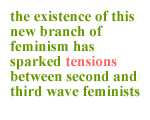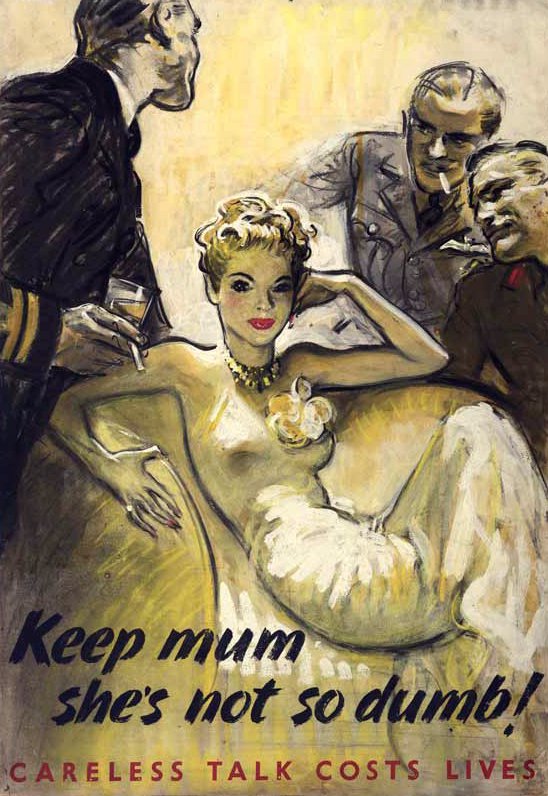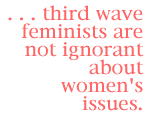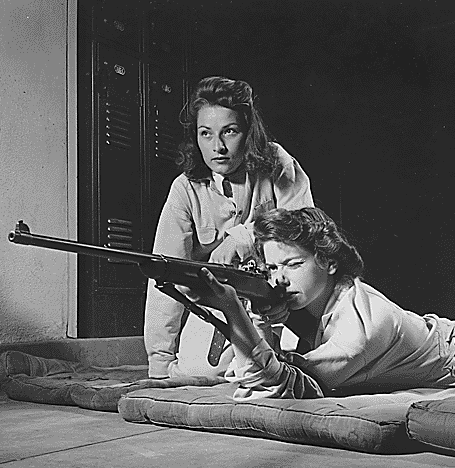 |
||||||||||||||||||||||||||
|
Analyzing Third Wave Feminism
Engendering Change: What's Up with Third Wave Feminism?By Krista Jacob. A new kind of activism is brewing among young women -- "Third Wave Feminism." Many of us, inspired by larger theoretical discussions about race and sexuality, have started to place a greater emphasis on establishing multiracial alliances among women. Young women celebrate pluralities
The movement seeks to broaden the parameters of feminism. Initially attracted to third wave feminism through the writings and activism of Rebecca Walker and Amy Richards, two well known third wave feminists, I was impressed by a central tenet of third wave feminism: Include certain groups of women who have previously been excluded as a result of race, class, and sexual orientation prejudice. Third wave feminism provides a forum for illuminating the multifaceted experiences of young women - a group that is consistently misrepresented by older generations, the mainstream media, and other avenues. Using young women's personal testimonies and autobiographical accounts, we reveal young women struggling to incorporate the lessons from the women's movement of the 60's and 70's (second wave feminism) into their own unique, lived experiences.
They show us that young women are celebrating their pluralities, embracing their personal and political contradictions: (ie: choosing to wear makeup while maintaining a critical stance toward the misogyny and racism inherent in the cosmetic industry), and refusing to follow a feminist party line. The "feminist party line" refers to what many young feminists perceive to be constrictive and unfair expectations set up by certain mainstream definitions of feminism, such as you can't:
wear makeup,
shave your legs,
wear dresses,
have a traditional wedding, or
celebrate your femininity
and still be considered a "feminist." The underlying assumption is that these choices somehow compromise your feminist politics and are reflective of "selling out" to patriarchal values.
tensions sparked between second and third wave feministsThough these expectations are by no means universal, many young women have expressed feelings of not "fitting in" with other feminists because of their refusal to live up to these standards. As Rebecca Walker states in her book, To Be Real: Telling the Truth and Changing the Face of Feminism: "For many of us it seems that to be a feminist in the way that we have seen or understood feminism is to conform to an identity and way of living that doesn't allow for individuality, complexity or less than perfect personal histories." But this pluralism is not limited to third wave personal politics; it exists in the political realm as well. Witness the large numbers of young women who are working on a litany of issues such as:
violence against women,
sweatshop exploitation,
reproductive freedom,
affirmative action,
race and class exploitation,
death penalty,
queer issues,
sexuality,
labor issues,
welfare rights, and so on.
The existence of this new branch of feminism has sparked tensions between second and third wave feminists. Though there is significant diversity of opinions among third and second wave feminists, and the tensions I speak of are certainly not universal, a generation gap exists that is worth exploring. A criticism frequently leveled against third wave feminists is that they embrace their contradictions and so-called pluralities to such an extent that they compromise many third wave feminists are not ignoratn about women's issuesimportant core feminist principals created by our feminist foremothers. For example, many young women's interest in exploring s/m sexuality is perceived by some to violate the feminist argument that the synthesis of sex and violence perpetuates violence and oppression of women.
Just as third wave feminists are more inclusive in their approach to race, class, and sexual orientation, they, also attempt to be more inclusive of varying ideologies, even those that deviate somewhat from the traditional feminist party line. Many second wave feminists charge that young women are ignorant about their history and are apathetic about their rights as women, whether it be their right to choose abortion, affirmative action, or women gaining the right to vote. There certainly is some truth to this argument. Women's history continues to be neglected by most high school curricula, and issues important to women, people of color, and the gay/les/bi/trans community are consistently misrepresented by mainstream, conservative, corporate-controlled media. However, in general, third wave feminists are not ignorant about women's issues. On the contrary, they simply believe that the current social and political climate is different than it was three decades ago and thus requires different political strategies.
For example, one point of contention for many older and younger feminists was the recent presidential election. Much to the chagrin of many second wave feminists, young women came out in droves to support Ralph Nader. Though he had no chance of winning, many young women (and men) were frustrated with the behavior of the Clinton/Gore administration because the only issue they stood firm on was abortion. Their conservative stance on welfare, trade, labor issues, foreign policy, the death penalty, gays in the military, and same sex marriage compromised progressive agendas – driving the Democratic party farther to the center - and forcing feminists to choose between the "lesser of evils." Frustration on the part of many second wave feminists is understandable considering their hard fought battles to elect pro-choice, pro-affirmative action, and pro-woman politicians, and to establish a unified feminist presence where there wasn't one before. But second wave feminists have been criticized by lesbians, women of color and working class women for having a white middle class bias and for excluding the issues specific to them. Critics argue that the "unified feminist presence" was in fact a false sense of unity. The many successes of the second wave feminist movement have afforded young women the privilege of employing more plural and comprehensive tactics. Unfortunately, this comprehensive approach to politics makes young women's activism look more fragmented, which can give the appearance of political inactivity or apathy. These tensions should serve as a call to action for both older and younger feminists.
Older feminists should embrace and encourage young women's activism and find at least one young woman in their life to mentor, and help navigate through the challenges of being young and feminist. Younger feminists should actively seek out a feminist mentor, read about women's history - including the history of working class women, women of color, lesbian and bisexual women -, and build on the knowledge gained through the second wave of feminism. The future of feminism hinges on the success of these relationships.
|
|
|||||||||||||||||||||||||
|
|
||||||||||||||||||||||||||
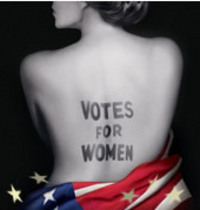
Different Generations, Different IssuesBy Alana Wingfoot - 1998. One of the problems with communicating across any generation gap is that the two generations have different issues to deal with. What works for the older generation may not even apply to the younger; what is unthinkable to the older generation may be a necessity for the younger.
This applies, of course, to second- and third-wave feminism. Some second-wavers shake their heads over us and decry us for not being serious, for not being 'real feminists' -- more specifically, for not focusing on the same issues they focused on. Of COURSE we don't focus on the same issues -- if you are a second-waver, how much time did you spend on getting the vote for women? (Not just for black women; for women in general?) Did you use the exact same methods that the first wave used? No, you didn't. And we face different issues and use different tools than you did, and the fourth wave will face yet another bundle of issues needing its own ways to handle them, and so forth.
Some of the differences between us:
We grew up in a different world. We run into different problems than you did. Is it any wonder that we work with different issues?
The Feminist Generation GapBy Kim Allen - 1998. My sneaking suspicion is that much of what's behind the miscommunication between the Second- and Third Waves of feminism is the generation gap between the Baby Boomers and Generation X. "Gen-X seems 'passionless'" What's wrong with those 20- and 30-somethings? They just seem so.... inert. So passionless. Especially the women who have turned out to be such lackluster feminists. (This is usually accompanied by a pitying sigh from the aging second-waver, who fondly remembers bringing heavy bulgar-soy casseroles to consciousness-raising sessions in which they dreamed up phrases like, "A woman without a man is like a fish without a bicycle.") Passionless? Let's look at this from a different point of view. The Baby Boomers are positively obsessive. They obsessed about the Vietnam War protests in the 60's, and then they swung 180 degrees and obsessed about making money and acquiring power in the "me" 80's, and now they are in full throttle reverse once again as they frantically save for retirement while getting misty-eyed over the "nostalgia" surrounding Woodstock and VW Beetles. (And god-save-us-all, their kids are wearing bellbottoms!!!). Next to the Boomers, darn near anyone looks "passionless." My main hope is that the stock market can survive their latest obsession. "Boomer" is a great name for a hiccup in the population curve that resembles the proverbial bull in the china shop. "Gen-X is so cynical" Where's the idealism? Where's that lust-for-life that ran rampant during the Summer of Love and fueled the great radical politics of that era? Well, let's see. Most of us became politically aware during the 1980's. Yeah, you remember-- the decade when big business was ripping off the consumer with greedy glee as the right-wing politicians looked the other way. Worse than that, most of the consumers seemed to be scrapping with each other over the chance to become part of the big business enterprise-- yuppies learned to drink martinis, play golf, and wear just the right designer labels to attract the attention of the influential boss. Women were supposed to be "supermoms," smiling like Dentyne commericals as they tripped off to important jobs all day, picked up the kids and a few groceries at dinnertime, made the family meal, and cleaned house all evening so everything would be spotless in case an important client dropped by. The government was worse than useless, spending most of its time puffing its chest at the USSR while shipping weapons all over the rest of world as bribes to get countries to act like they supported democracy. Then they claimed to forget that any of this had happened. Domestic policy consisted of declaring a return to "family values" and lambasting Democrats for "tax-and-spend" policies while simultaneously passing the biggest tax increase in American history and sending the Federal deficit over the trillion-dollar mark. And you're surprised that we don't trust anyone????
We're not stupid, you know-- we saw how badly Big, National Organizations like huge companies, the US government, and conventional political parties screwed up. And we're the generation living with the fallout! Proposition 13 hurt our schools. The ERA never passed. Collectively, 18-35-year-olds understand that we need different strategies this time around. We'd rather trust ourselves. The real kicker is when Boomers tell us how ideologically "pure" they are, while Gen-X is simultaneously confused and overly opportunistic. Shyeah, right. Don't forget what we see from our perspective: We see in the Boomers a generation who (1) did all that radical protesting, taking-over-of-buildings at Berkeley, and pot-smoking during the 1960's and (2) elected an extremely conservative B-movie actor who was in the early stages of losing his mind in the 1980's. OK, so maybe that was two different segments of your generation, one radical left and one radical right. Nonetheless, this harks back to the obsessiveness-- you guys are way out there in all directions. We feel a little nervous about trusting you, and we certainly don't consider you any more ideologically pure than the rest of us! We grew up in a different world We're a little harder-boiled than those who came of age in the 1960's, which isn't so surprising when you really look at the facts. We approach problems differently. We have different priorities, and place our trust in different methods. In particular, as feminists, we are more practical and less ideological than our second-wave predecessors. "The system" has failed us-- we want to do things ourselves because then we know they'll be done right. We don't want a Women's Center on campus; we want a woman as Class President, making political decisions for the student body. We want women CEO's, venture capitalists, and funding agents, controlling the flow of cash and capital in modern business and research. We don't want "sisterhood"; we want independence, freedom, and as many choices as possible. It's the same dream, in modified form. And each day, it comes closer to reality. But the generation gap persists. I can't make it go away, but perhaps by drawing attention to it, I can help the Second Wave understand where the Third Wave is coming from.
|
||||||||||||||||||||||||||
 |
|
 |
||||||||||||||||||||||||




